Window Cleaning Cost
Last updated 23rd March, 2025
Looking to find out how much window cleaners charge near you? Dive into this window cleaning pricing guide for insights about what to expect to pay in your local area.
Discover all you need to know about how much window cleaners cost (typically ranging from £10 to £25 for an average house). Find costs for services like water fed pole cleaning, internal and external window washing, and more!
Ready to learn more about the cost of window cleaning? Check out the details below!

How Much Is a Window Cleaner?
Having your windows professionally cleaned can help your home feel light and bright, help them last longer, improve your home's energy efficiency, and maintain kerb appeal.
So, how much does a window cleaner cost in the UK?
On average, professional window cleaners charge in the region of £10 to £25 for a 3-bedroom, semi-detached home to have windows cleaned on a regular basis in the UK.
Table of Contents
- How much is a window cleaner?
- Additional window cleaning costs
- How much do window cleaners charge?
- What does window cleaning involve?
- What impacts window cleaner costs?
- DIY window cleaning
- Traditional window clean vs water fed pole
- How often should I have my windows cleaned?
- How much will it cost to clean my conservatory?
- Related home maintenance jobs
- Building regulations
- How to find and hire a local window cleaner
- FAQs
- Sources
Window Cleaning Prices
A number of factors impact the cost of having your windows cleaned professionally. This includes the property's size, the area of the UK that you live in, ease of access to the windows that you want cleaned, and the cleaning method used.
As a rough guide, you can expect the following charges according to property type:
| Property Type | Average Cost (monthly) | Average Cost (one-off) |
|---|---|---|
| Flat | £4 – £8 | £8 - £15 |
| Terrace house | £6 – £10 | £10 - £20 |
| Semi-detached | £10 – £25 | £25 - £50 |
| Detached | £15 – £35 | £30 - £70 |
Whilst some companies charge based on the size of the building, others will charge according to the number of windows and doors that require cleaning, charging anything from £1 to £5 per window pane.
As window cleaning is something that most homeowners have done on a regular basis, it's advisable to get quotes from various window cleaners near you to find the best deal. Small differences will add up over a year!
Most window cleaners charge additional fees if you're only looking to arrange a one-off cleaning of your windows (sometimes twice the cost quoted for a regular clean). You'll get a discounted window cleaning price if you agree to stick with them for a while.
Additional Window Cleaning Costs
When you're looking to get your windows cleaned, there are multiple extras that might be included or excluded from the window cleaning price you're quoted.
Because of this, you should ensure that you're clear what is included when considering quotes from window cleaners.
For example, whilst some companies offer frame and sill cleaning as standard, others will charge for this service — which might come as a shock!
Initial ‘First-time’ Cleaning Fee
Some window cleaners charge an initial fee to get your windows cleaned up to standard and carry out an assessment regarding window condition and methods needed to complete the clean.
If this applies to you, then window cleaners charge for this at about twice the normal rate of a clean.
Window Frame Cleaning Cost
Included as standard by some companies, though others charge – expect an additional £1 to £5 per frame cleaned.
Special Window Cleaning Cost
This applies if you're looking for someone to clean skylights, conservatory roofs, and roof lanterns.
The price you're charged will depend on the size and positioning of the window. Conservatories take considerably longer to clean than a skylight, but both require specialist equipment — which will impact the cost of a window cleaner.
Frequent conservatory cleaning is considerably cheaper if included alongside regular window cleaning services rather than an independent clean.
Typically, you should expect the cost of cleaning exterior conservatory windows to be between £60 to £150. But if your conservatory needs a deep clean, then it could cost up to three times as much.
Solar Panel Cleaning Cost
On average, you should expect to pay an additional £5 to £15 per panel for someone to clean solar panels — with most companies applying a minimum charge in the region of £50.
Gutter Cleaning Cost
Prices will vary according to length and location of guttering, with ground-floor guttering averaging £5 per metre. However, it will cost upwards of £10 per metre for guttering above the second floor. Some companies have a minimum additional charge for this service.
Internal Window Cleaning Cost
Usually charged at a similar rate to external window cleaning, though often considerably cheaper if both services are used together. This service usually includes internal window panes, frame, sill and track cleaning.
Window Cleaning Cost Breakdown Calculator
Average cost of having the windows cleaned on a 3-bedroom semi-detached home as part of a regular service - Total Cost: £15
Labour
£15
Waste Removal
£0
Materials
£0
How Much Do Window Cleaners Charge?
There are a number of factors that will influence the cost and the timeframe that the window cleaning service will take, including things such as...
- The number (and size) of the windows being cleaned.
- The types of windows being cleaned.
- The cleaning method used.
- How accessible your windows are.
- Whether any specialist equipment is needed (e.g. scaffolding to reach higher up windows)
- Your location within the UK (with London and the surrounding boroughs generally costing more).
Typically, for a 3-bedroom semi-detached home you can expect to pay in the region of £10 to £25 for windows and doors to be cleaned. This would take roughly 1 – 2 hours (depending on accessibility and level of dirtiness) for a window cleaner to complete.
| Property Type | Time Required | Approximate Cost |
|---|---|---|
| Flat | 1 - 2 hours | £4 - £15 |
| Terrace house | 1 - 2 hours | £6 - £20 |
| Semi-detached | 1 – 2 hours | £10 – £50 |
| Detached | 2 hours | £15 - £70 |
What Does Window Cleaning Involve?
There are two main methods used in window cleaning: traditional window cleaning and water-fed pole cleaning.
For a basic window cleaning service, once access to the window has been established, you can expect the provider to rinse the windows - either using a mixture of water and cleaning solution applied to a large sponge or fibred cloth or with using purified water fed through an extendable pole.
If a cleaning solution has been used, the windows will need to be wiped-down to remove residue and produce a streak-free finish. Purified water does not need to be removed, and will naturally dry streak-free.
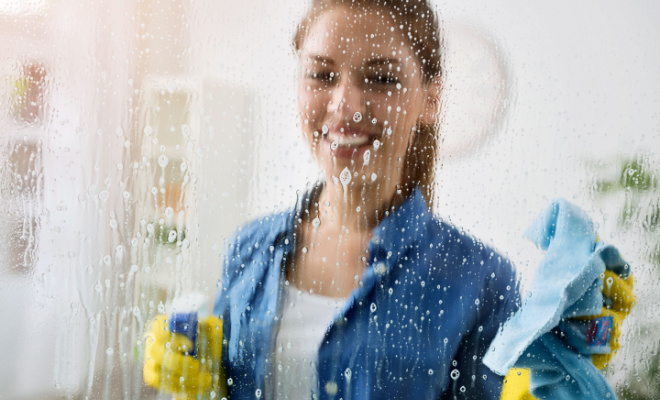
More comprehensive cleaning services may include washing down of sills and frames using a similar method to the one outlined above. Some window cleaning service providers have an additional charge for their first clean where they will check all the windows are fit-for-purpose.
They will bring the cleanliness up to a good standard (which, in cases of particularly poorly-maintained windows can take up to three washes), which then allows less-intensive maintenance cleans in the future.
Solar panel cleaning, conservatory, and specialist windows (such as skylights) are almost always cleaned using a water-fed pole system as they can be awkwardly positioned and can pose a safety risk to the service provider if they tried to access them with a ladder.
What Impacts Window Cleaner Costs?
There are numerous factors that can impact the price that local window cleaners charge, which you should be aware of before selecting a service provider.
Building Size and Type
Some companies charge according to the scale of your home, others according to the number of the windows, and others again charge based on a combination of the two.
Number and Size of Windows
The number and scale of windows that require cleaning will undoubtedly affect the price; the greater the surface area, the longer the work will take to complete.
The windows of a small, 1-bedroom flat are going to be considerably cheaper to have professionally cleaned than a large, 5-bedroom detached home, and windows with multiple panes will take longer to clean than a single-paned window.
Number of Floors
The number of floors your home is spread over will impact the price based on accessibility and additional labour time, particularly if larger scaffolding structures or ladders need to be erected before the work can commence.

Internal and External Windows
Unsurprisingly having both sides of the window cleaned doubles the surface area that requires maintenance, which will impact the overall cost of the service; though many companies offer a small discount if both sides are cleaned at once, compared to separate internal and external services.
Location of Property
If you live within London or the surrounding boroughs it will be little surprise to you that the cost of window cleaning services is generally above the national average of the UK. In a similar vein, rural housing where cleaning services are in less demand tend to be cheaper, usually due to the competitive nature of the work.
Commercial Window Washing vs Residential
Residential window cleaning is considerably cheaper than commercial window cleaning, due to the difference in window sizes and accessibility to the site.
On top of that, there's additional risk to the surrounding areas when window cleaners work on commercial properties, as there is more likely to be a heavier footfall nearby. This can cause time delays and liability risks — which will be factored into the cost that a window cleaner charges you.
DIY Window Cleaning
In many instances, window cleaning is a perfectly acceptable DIY task to complete, providing you have the right equipment and the windows are easily accessible.
Below are some of the most common DIY window cleaning methods:
External Window Cleaning
There are a few ways which external windows can be cleaned depending on what you find is the best method:
Traditional Bucket and Cleaning Solution
The most common DIY window cleaning technique requires little more than a bucket, some water, and a mild cleaning solution.
You could use a specialist window cleaning chemical, costing between £1.50 to £4.00 for 750ml. However, a cheaper alternative is just washing-up liquid, which costs as a little as 80p per 500ml. If you decide to use washing-up liquid, then ensure you use it sparingly — trying not to create too many suds as they can be difficult to remove without causing streaks and smudging.
Cheaper still is a home-made, environmentally friendly solution of 1-part tap water to 1-part distilled vinegar, costing roughly 40p per litre, a large sponge which costs on average 70p to £2 and a microfibre cloth or squeegee which can be purchased from around £2.
Fed Pole and Cleaning Solution
Similar to the professional water-fed pole cleaning technique, but utilising tap water instead of pure. The pole, which can be purchased for between £12 for a basic pole with washer attachment up to around £80 for a high-quality, durable pole with a mixed-head attachment, can be attached to a hose.
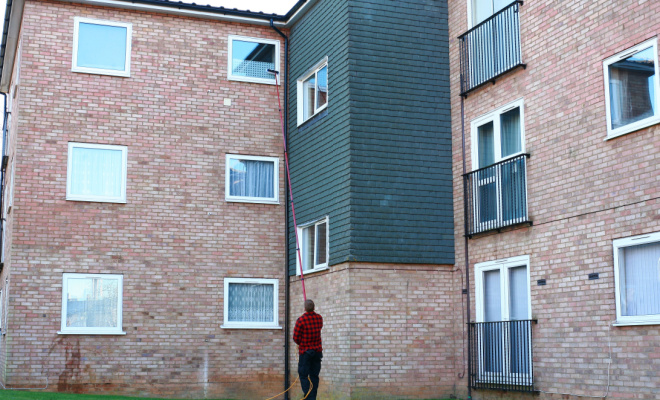
Unlike professional services, as the water isn’t pure, you will still need to use a cleaning solution in order to remove grime, which will need to be rinsed off to avoid streaking.
Fed poles are ideal for conservatory roofs, but you will still encounter issues when trying to remove residue from harder to reach windows without utilising a ladder unless you purchase a pole with a duel washer and squeegee attachment.
Pressure Washing
There is some debate regarding the use of a pressure washer to clean windows, as incorrectly done it could cause damage to yourself and your property - the last thing you want to do is break a window whilst trying to clean it.
Whilst pressure washing windows can be quick to do, it is not necessarily efficient, and you may still find streaking and water-spotting is an issue. This means you will still need external access to the windows, probably with a ladder, to dry them off afterwards.
If you do choose to use a pressure washer, which can cost between £60 to £300 to purchase depending on the model and pressure output, make sure the nozzle is held at a good distance from the window panes and is on a low-pressure setting, with a wide-spray nozzle.
Internal Window Cleaning
Internal window cleaning is far less likely to involve water-fed poles or pressure washing due to the excess water they produce; so internal windows should be handled using the traditional window cleaning method.
Ideally, blinds and curtains should be removed and preferably washed whilst internal window cleaning takes place. This allows more room for manoeuvrability in the cleaning process but also means that any dust or debris within the fabrics will be removed. If you skip this step, then you may find that your clean internal windows don’t stay clean for long!
With a soft brush or cloth, wipe down along the windowpane and sills, removing any visible dirt or cobwebs. Next, you will want to apply a mixture of water and chosen cleaning solution across the internal windows, followed by a rinse with clean water. Make sure that your application tool (sponge or cloth) is not too saturated as this will cause a lot of run-off and make an excess mess.
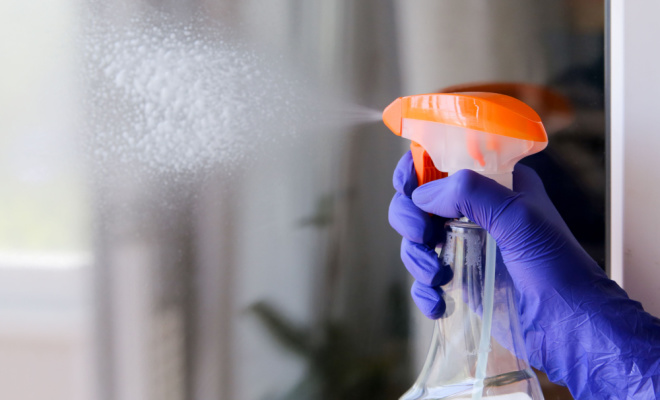
You can then dry remaining water from the windows with either a squeegee, microfibre cloth (or even old t-shirt) or paper towels. It’s recommended that wiping goes across the windowpane. This ensures that excess water drips to one corner and not across the entire sill — making it easier to clean up.
Window tracks will be cleaned last, usually with a similar cleaning solution to that used on the window. However, some people may choose to use a mix of baking soda (costing roughly 70p to £1.50 for 200g from most retailers) and white vinegar, scrubbing with a toothbrush to remove residue from corners, and then cleaning with a damp cloth or paper towels.
Whilst it may be tempting to clean all of your home windows yourself, it may not be advisable, particularly if you have hard-to-reach windows or windows on a first floor or higher that cannot be accessed with a stable ladder.
In these cases, you should contact a professional to complete the work who will have the right training and equipment to complete the task – as well as liability insurance should an accident or injury occur.
If you only have adequate access to some of your windows, it may be worth hiring a professional service to complete all the cleaning for you, as this will ensure a consistent service and finish across your home, and a professional will undoubtedly be able to complete the cleaning process much quicker than if done yourself as well. It's worth weighing up the cost of window cleaner charges against the time spent to do it yourself.
Traditional Window Clean vs Water Fed Pole
The two most popular methods for cleaning windows are the traditional method and the water-fed pole method. Windows cleaners using these different techniques generally quote similar window cleaning prices.
But which is better?
Traditional Window Cleaning Method
Traditional window cleaning uses water infused with a cleaning solution, a sponge and a squeegee.
Where necessary, dust and debris may be removed from the window to avoid causing scratches to the glass prior to cleaning; this is done with a soft brush or rag. Next, the water and cleaning solution mix are applied to a windowpane using a sponge.
Once the pane is covered, the mixture is then removed, typically using a squeegee, (or sometimes a soft microfibre towel) working from top to bottom to ensure no moisture is left on the window.
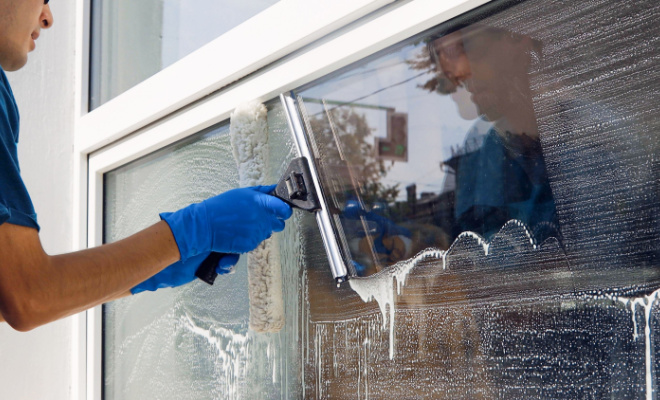
It's important that only one pane is done at a time; otherwise, the solution may dry before it can be removed, which will result in streaking. For windows above the ground floor, a ladder or small scaffolding structure will likely need to be used.
Advantages
- ✔ The glass is dried during the process, so it is easy to see whether any dirt remains as results are immediate.
- ✔ Good for use in high-traffic areas as the excess fluid is controllable.
- ✔ Suitable for internal and external use.
- ✔ Easier DIY option.
Disadvantages
- ✖ It can be intrusive because the worker will need to be close to the window to access it, meaning they may be able to see into your home.
- ✖ Requires a ladder or scaffolding for high-up or difficult to reach windows.
- ✖ Chemicals used in glass cleaning can attract dirt, meaning they may become dirty quicker than windows cleaned with the purified water-fed pole system.
Water Fed Pole Window Cleaning Method
A more contemporary cleaning method is water-fed poles (WFP), sometimes referred to as a reach-and-wash system. WFPs utilises a telescopic pole with water jets and a cleaning brush attached to the end. Purified water is fed through the pole and the windows are brushed to remove dirt and grime.
Unlike the traditional method (that uses water and cleaning solution mix), pure water leaves a streak-free finish that does not require wiping down after application. It's also a more eco-friendly due to the lack of chemical additives.
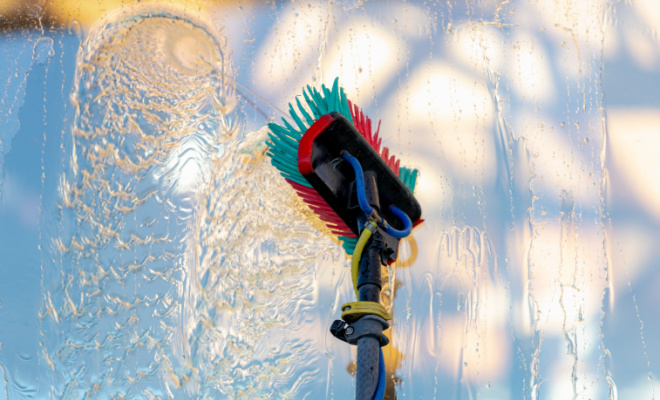
In some instances, a water-fed pole may be used but with ordinary water instead of pure. In these instances, the water will need to be mixed with a cleaning solution and removed in a similar fashion to traditional cleaning; with a squeegee or microfibre cloth.
Advantages
- ✔ Less risk of the cleaning cleaner injuring themselves, as ladders aren't required.
- ✔ Less invasive as windows can be cleaned from a distance.
- ✔ No chemical cleaning agents needed, so it is more environmentally friendly.
- ✔ Less labour-intensive system.
- ✔ Quicker than traditional cleaning methods.
Disadvantages
- ✖ Not suitable for internal use.
- ✖ Windows are left to dry naturally, meaning that any missed areas will not be apparent immediately.
- ✖ Cleaning stubborn surface grime can be more difficult and more time consuming than traditional cleaning methods.
- ✖ Not good for high-traffic areas as water trickle can be difficult to manage.
Which Window Cleaning Method is Better?
General consensus is that professional water-fed pole cleaning utilising pure water is superior in terms of time management, ease of access and end result.
But this will be influenced by the workman involved. A professional with 20 years of experience in traditional window cleaning methods might deliver better results than a cleaner with little water-fed pole experience.
The water-fed pole method is preferential for windows that are difficult to reach and is being used more frequently in residential cleaning today.
High positioned windows, skylights, and conservatories are often cleaned using the water-fed pole method as it allows access without having to utilise ladders or scaffolding structures (in most cases), which in turn poses less risk to your property and the window cleaner.
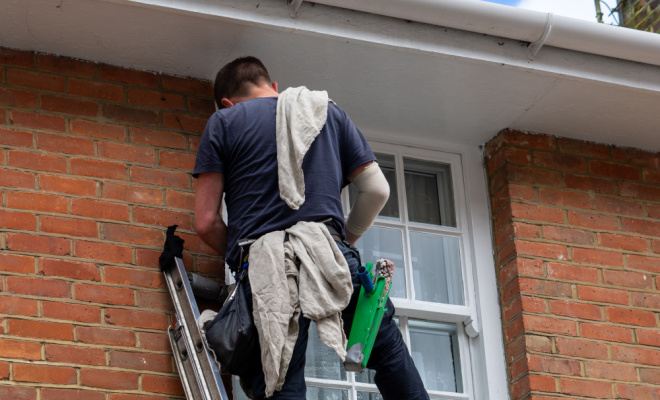
Nevertheless, traditional window cleaning methods are still efficient in terms of the end result and are a practical DIY solution to window cleaning, where appropriate, as well as being suitable for both internal and external use.
How Often Should I Have My Windows Cleaned?
How often you should clean your windows will vary depending on your property location and needs.
Homes in high pollution areas such as cities need more frequent window washing in the countryside where there is less pollution.
Most experts recommend thoroughly washing windows twice a year. But when looking to hire a window cleaner, you may choose to have them clean your windows every week or so. Mostly it will depend on your needs and location of your home.
Just like the price of professional cleaning services for the inside of your home, window cleaning prices will vary depending on how long the job takes.
More frequent window washing does mean that the overall time taken per session will be dramatically decreased compared to two yearly deep cleans, and many companies offer a discounted rate for more frequent visits — so it's best to talk to your window cleaning provider to discuss your options and budget.
How Much Will It Cost to Clean my Conservatory?
The cost of cleaning a conservatory will depend on factors such as the size and style of the build — in addition to your location in the UK.
Many cleaning companies price their conservatory cleaning service based on the number of panels on the roof and frames, with a minimum charge of at least £50 for a one-off clean, and with lean-to conservatories generally being cheaper to clean than Victorian or Edwardian style conservatories.
Typically, prices are as follows for a medium-sized conservatory within the UK:
| Type of Job | Average UK Cost |
|---|---|
| Clean Exterior Conservatory Windows | £60 – £150 |
| Clean Interior & Exterior Conservatory Windows | £90 - £300 |
| Full 'Deep Clean' of a Conservatory | £350 – £650 |
For the exterior of a conservatory, an average of 2 to 4 hours are needed to properly clean the windows, frames and roof, along with the sills, trims and ridge, though it may take longer if the conservatory has not been serviced in some time.
A deep clean generally involves any guttering also being cleared of debris, with internal fixtures being polished and cleaned — such as hinges, locks and handles. In some cases, a water-repellent solution is applied to the exterior of the windows to discourage debris build-up.
The average cost of gutter cleaning is around £100 to £150, which is included in the estimated conservatory cleaning costs shown above.
It might be possible to clean your conservatory yourself, providing you can reach necessary surfaces without posing a risk of injury or damage to yourself or your property.
Cleaning window tracks and fixtures are relatively simple tasks, whereas accessing a conservatory roof may not be so straightforward and will most likely require professional servicing to get the best results without any risk of injury to yourself.
Related Home Maintenance Jobs
Window cleaning is one of a range of household maintenance tasks that should be undertaken regularly to keep your home clean and safe.
Just as with the cost of window cleaning, putting these maintenance jobs off for too long can increase the price over time. Here's a rough guideline on how often you should aim to get them done:
| Maintenance Job | Frequency |
|---|---|
| Clean Patio | 6 - 12 months |
| Clean Gutters | 6 - 12 months |
| Clean Roof | 1 - 5 years |
| Clean and Seal Driveway | 1 - 2 years |
| Maintain Garden | 1 - 2 weeks |
Clean Your Patio
Looking after your patio not only improves the look and safety of it in the short term but it can also prolong its lifespan.
Moss, algae and other everyday grime builds up on any patio, although those more exposed to the elements and left without cleaning for long periods will suffer more. Tackling these issues with a jet wash clean can make a noticeable difference to how a patio looks, plus it can reduce the slippiness of the surface.
Ideally, patio pressure washing should take place every 6 to 12 months. Patio cleaning prices will depend on the size of the area and how long it will take to complete the clean.
Clean Your Gutters
Household gutters can cause some real problems if left without maintenance for too long.
Any build-up of debris in gutters can have knock-on effects both inside and outside the home. As well as potentially causing drips and water damage on the external walls of a property, water may also enter inside the house and cause damp patches.
By the time these issues make themselves known, the costs of fixing them could significantly outweigh regular gutter cleaning costs.
Aim to have your gutters cleaned out around twice a year to maintain them correctly.
Clean Your Roof
Just like patios, roofs will collect debris, moss and lichen over time. A build-up of these can cause the roof to retain moisture and may damage the roof, reducing its lifespan.
There are different methods of roof maintenance, from manually removing moss and lichen to pressure washing the roof in a deep clean. Bear in mind that a pressure wash could cause damage if a roof is already vulnerable to the elements, so consult a professional before making any decisions.
Roof cleaning prices will depend on the work you're having done and how much time it will take. As a rough guide, you should try to remove moss and algae from your roof every 1 to 3 years, while a deeper clean may be appropriate every 3 to 5 years.
Clean and Seal Your Driveway
The surface of your driveway is susceptible to wear and tear caused by both everyday use and environmental factors.
Cleaning a driveway can remove debris, making it look better and improving the safety of it by getting rid of slip or trip hazards. However, for long-term protection, sealing a driveway can prevent moisture getting into the surface, reducing the potential for cracks and holes to appear.
The average cost of cleaning and sealing a driveway will vary depending on where you are in the country, how badly the driveway has deteriorated, and how big the area is.
Maintain Your Garden
Keeping your garden in good condition can improve the overall look of your home, as well as lowering garden maintenance costs in the long term by keeping on top of small issues before they escalate.
How often you should hire a tradesman to maintain your garden really depends on the size and style of it. A small garden may have lots of pruning to do or it may be minimalist, while a larger garden could have lots of jobs to do or simply require mowing.
As with all household maintenance tasks, every home's needs will differ, so consult a professional to get a clearer idea of costs.
Building Regulations
Under Health and Safety Executive guidelines, window cleaning can come under the ‘Work at Height Regulation 2005’ and so the cleaner must take all steps, where reasonable to do so, to avoid working at height and minimise the risk of doing so where applicable.
HSE also states that the window cleaner must have the right skills, knowledge and experience before undertaking related work; window cleaning that requires abseiling, for example, will require different skills comparative to a window cleaner required to work at ground level.
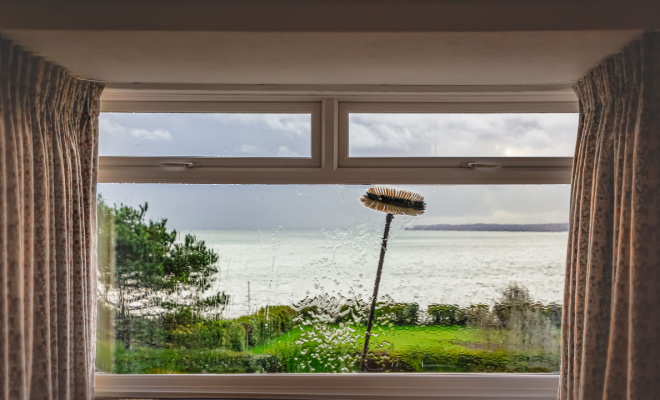
A competent window cleaner will undertake a risk assessment of any property they intend to complete work at. This allows them to assess the building structure and groundworks and determine the best cleaning method to use if safe to do so, ensuring they are operating in line with HSE standards.
How to Find and Hire a Local Window Cleaner
The easiest way to find a professional window cleaner near you is through recommendation. Ask your family and friends if there's anyone that they'd recommend you talk to about window cleaner prices. This is a good indicator of the quality and professionalism of the service provider.
Another option is to ‘shop around’ and get quotes from multiple service providers for the work they complete and the methods they use. You can also submit your query here to get three free window cleaning quotes from trusted workers in your area.
You should ask your window cleaning provider what experience and accreditations they hold. Many window cleaners are Safety Accredited Members (SAM) of the Federation of Window Cleaners, which indicates that the person completing your window cleaning work has undergone training and demonstrates compliance with health and safety laws.
Your window cleaner should also hold adequate liability insurance to cover them and your property on the event of any accident or damage they cause.
FAQs
For an average-sized 3-bedroom semi-detached home, you can expect to pay in the region of £10 - £25 per month to have your windows cleaned, with additional charges for conservatories or extensions.
It’s best that you contact local window cleaning companies in your area to determine the best price available to you for the services you require.
Sources
https://www.hse.gov.uk/cleaning/topics/window-cleaning.htm
https://f-w-c.co.uk/
https://www.windowgenie.com/blog/how-to-clean-outside-windows/
https://www.telegraph.co.uk/interiors/home/best-way-clean-windows/










